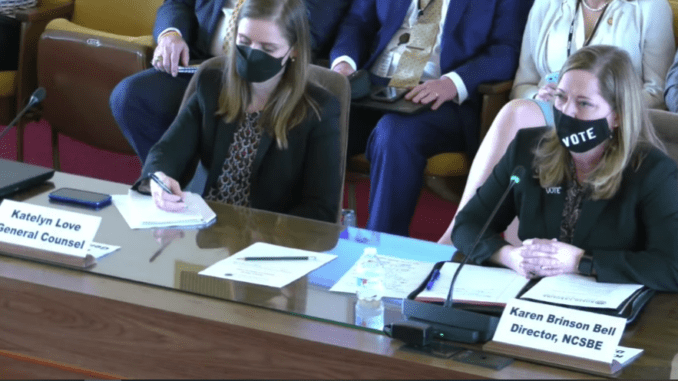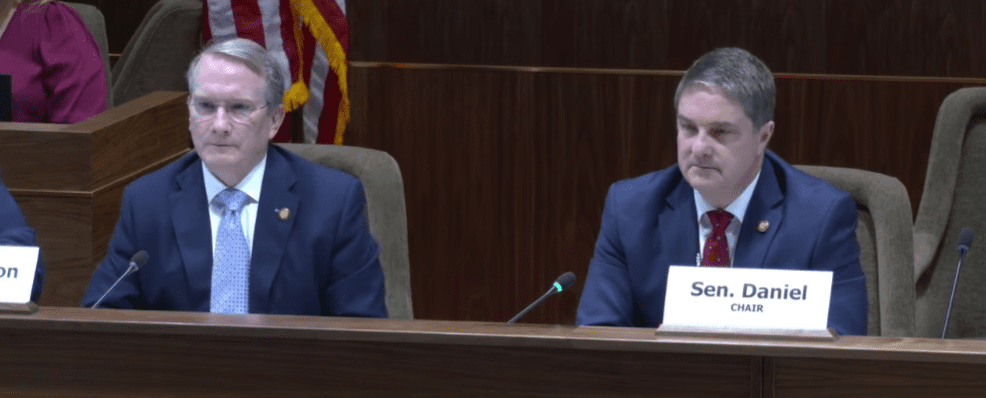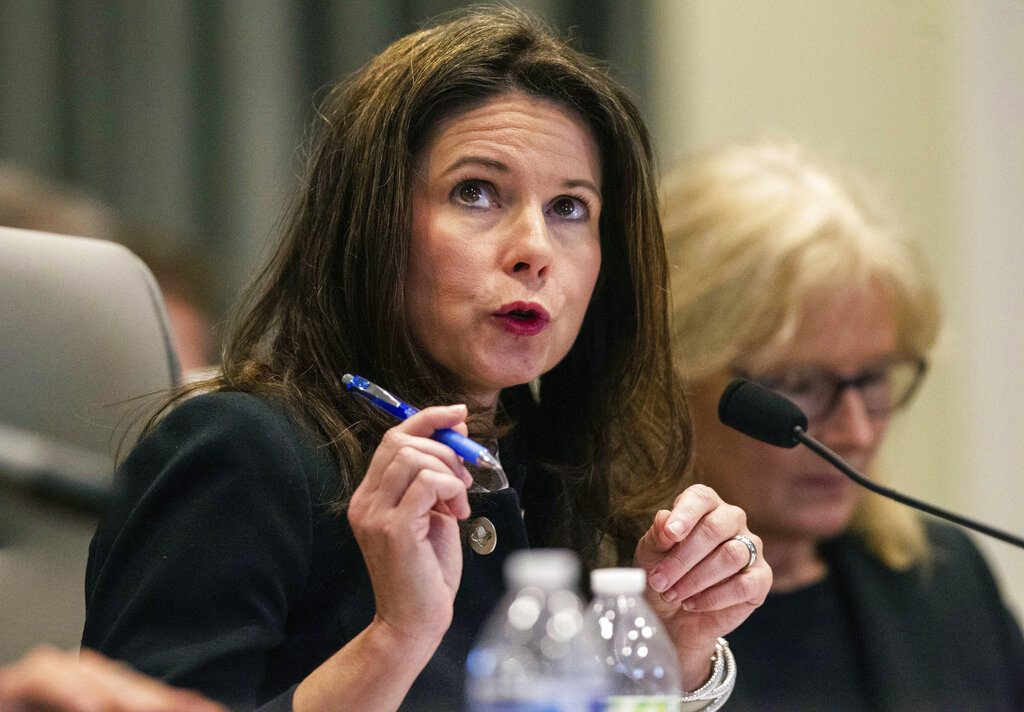
RALEIGH — The Senate Redistricting and Elections Committee held a hearing questioning State Board of Elections (NCSBE) executive director Karen Brinson Bell about her conduct and her role in a consent agreement that effectively changed North Carolina elections law during the 2020 cycle.
The hearing was run by the committee’s co-chairs and lasted over two hours, throughout which Brinson Bell maintained that her actions and the consent decree did not change election laws. Topics included trust in the process, how rule changes impacted elections law and Brinson Bell’s Twitter account.
Sen. Paul Newton (R-Cabarrus) opened the proceedings by reading a statement summarizing Brinson Bell’s actions and the contents of the consent agreement which lawmakers consistently called the “secret agreement” due to the General Assembly not being informed of its existence until it was filed with the court. Lawmakers also made a fact sheet with a timeline of the events surrounding the consent agreement and Moore v. Circosta case available in a press release.
Prior to entering into the consent agreement, Brinson Bell asked the legislature to remove the witness requirement entirely and extend the time limit for accepting absentee ballots after election day. That time limit was already three days, but Brinson Bell wanted nine. The legislature did change the absentee ballot witness requirement to one instead of two and Newton noted the extension of the absentee ballot window was “explicitly declined” by “both bipartisan super-majorities” and said, “That window, in the law, remained three days.”
“Over the summer of 2020, several lawsuits were filed in states around the country, including North Carolina. That litigation sought to change state election laws,” said Newton. “In fact, the Democratic Party mounted a nationwide litigation assault on election laws. It was noted by three Fourth Circuit judges that some 385 lawsuits were filed to change existing elections laws in 2020. The judges called it an “avalanche of partisan and destabilizing litigation.””

Newton noted none of the lawsuits were successful in our state at the time the consent agreement was entered into and stressed that “Federal Judge William Osteen upheld the bipartisan state law requiring one witness to sign the absentee ballot and that was August 4, 2020.”
Newton continued, stating that two weeks later the NCSBE, which “democratic party appointees control” issued rules in compliance with Judge Osteen’s decision.
Two weeks later, on Sept. 4, 2020, absentee by-mail balloting began in North Carolina and the 2020 general election was underway.
“Unbeknownst to the public and unbeknownst to the legislature, Director Brinson Bell was secretly negotiating with the national Democratic Party’s top lawyer Marc Elias to reach a “settlement” of one of the pending lawsuits,” Newton said.
“How do we know the negotiations were secret?” asked Newton. “Because the legislature was also a party to that lawsuit yet the settling parties withheld all information surrounding the talks. We didn’t know about the existence of the negotiations until the settlement was announced.”
On Sept. 22, three weeks after voting began, the NCSBE announced the settlement agreement had been reached “with the Democratic Party’s lawyer.”
Newton said that lawyers representing the legislature were supposed to participate in a deposition on the morning the NCSBE announced the agreement. He said that when their lawyers arrived for the deposition that a lawyer working for Attorney General Josh Stein told them he didn’t know why nobody else had shown up, yet Stein and attorneys from his office had participated in the secret settlement.
“Two hours after claiming ignorance, that same lawyer filed a 28-page settlement agreement with his name on it on behalf of the board of elections,” said Newton. “Not coincidentally, the secret settlement agreement achieved the policy goals that Director Brinson Bell had requested that the bipartisan supermajorities had rejected.”
“In the words of multiple federal judges, the agreement eliminated the witness requirement for absentee ballots. It also extended the absentee ballot receipt deadline from three days after election day to nine days,” said Newton. “Both provisions changed state law after voting began.”
Following the announcement of the secret agreement, leaders of both chambers of the General Assembly filed suit. Brinson Bell then claimed the agreement was fulfilling the requirements of Judge William Osteen’s Aug. 4 decision, yet neither she nor the board’s attorney’s notified Osteen of their secret settlement.
When Osteen learned of the agreement and Brinson Bell’s claims, he said that the board’s action is “an unacceptable misuse of the remedy created by this court’s order. The state board’s mischaracterization of this court’s injunction in order to obtain contradictory relief in another court frustrates and circumvents this court’s August order.”
Newton went on to read additional quotes from Osteen and the Fourth Circuit regarding the settlement. Osteen wrote that “For the second time in this case, this court has serious concerns about the conduct of the North Carolina State Board of Elections.” Osteen also called the board’s actions a “flagrant misuse of this court’s injunctive relief” that “appear to ignore the rule of law.”
“The actions taken by the board of elections under Director Brinson Bell’s leadership compromised an essential fixture in our form of government: Trust,” Newton said. “Trust that those administering an election are fair and impartial.”
Newton said he believed it was “indisputable that when an unelected partisan panel secretly negotiates with a political ally to change election laws after voting has begun, confidence in the electoral process will be shaken. That is regardless of the political party involved. It is the very definition of collusion.”
“We’re here today to get answers from you, Director Brinson Bell, about your conduct and, to the extent you are willing to share it with us, your motives for such conduct,” Newton said as he turned the first questions over to committee co-chair, Sen. Warren Daniel (R-Burke).
Daniel asked Brinson Bell if trust was important in a Democracy. Her response was that she has worked in elections for “15 years” and that trust is “undoubtedly important to voters.” She then referenced a voter confidence program initiated in 2019 and said she had made sure elections were “secure,” including the “health and safety” of the voters in the state “during a pandemic like we’ve never seen.”
Brinson Bell said the “trust of the voters showed through when we had unprecedented voter turnout.” She also recited 2020 election statistical information including the record 75.4% rate of voter turnout and “5.5 million ballots cast.”
Changes to rules and laws
Daniel pressed Brinson Bell about the rules being changed after voting began.
“To what you speak, I believe the rules were not changed,” Brinson Bell said. “Or, I should say, the rules were changed, but the laws were not changed.”
Daniel pressed Brinson Bell again as to whether changing the rules harmed the public’s trust in the process. Bell didn’t directly answer the question, stating instead that the NCSBE had “been receiving calls” that people were worried about voting safely during the pandemic and she also said voters blamed the post office for failing to assure they could deliver ballots in a timely manner.
Daniel restated his question, asking Brinson Bell again about changing the rules after voting had begun. Brinson Bell again did not answer the question and blamed the changes on the pandemic, saying that the “rules needed to be addressed because of the pandemic.”
“A five-member bipartisan board unanimously chose to take action on three matters when the plaintiffs were seeking considerably more actions,” said Brinson Bell of the three-hour closed-door board session. “Including the removal of the witness altogether, prepaid postage, the elimination of the witness requirement…it’s more involved than that.”
Brinson Bell, a registered Democrat, went on to claim that the rule changes were decided upon based partly out of fear of more demands and partly on actions in other cases filed around the country.
“What they were working to do was ensure the least amount of changes to the rules because we had indication from across this country that the courts were intervening and they were making more substantial changes than what the state board in a unanimous fashion chose to do,” said Brinson Bell.
During her testimony before the committee, Brinson Bell also acknowledged that her main point of contact was N.C. Department of Justice attorney Swain Wood, a political hire and top member of Attorney General Josh Stein’s office.
During questioning, Brinson Bell indicated she was not concerned that Stein’s office was closely involved in the consent agreement with Stein himself was on the ballot for re-election.
General Assembly kept in the dark
Brinson Bell was also asked about when the board realized that the General Assembly was being kept in the dark about the settlement agreement during their three-hour closed-door session.
Bell told Daniel “I was not aware they were in the dark” and that was “not her concern.” She said that state law gives the board authority to settle lawsuits and take such suits “before a court for approval.” Brinson Bell also said that the board had vested negotiating authority in her.
“You don’t deny the General Assembly lawyers weren’t aware of the settlement and only found out about it when it was submitted to the court?” asked Daniel.
“The State Board of Elections does not have the authority to settle for legislative leaders,” answered Brinson Bell. “They have authority to settle on behalf of the State Board of Elections.”
Daniel followed up, asking Brinson Bell when she personally learned that lawmakers were kept in the dark. Brinson Bell finally answered “I don’t recall. That was not a point for me to be concerned about. I was administering an election.”
“You broke the law”
Later in the hearing, Newton would revisit Brinson Bell’s “rules change” comment, asking her if she was the “arbiter” of rule and law changes. Brinson Bell replied that the board acted within the law to settle lawsuits, especially during a pandemic, and added that the General Assembly was not in session.
The rules change remark would come back to haunt Brinson Bell when Sen. Bill Rabon (R- Brunswick) asked her why she did not ask the governor to call lawmakers back into session.
Bell responded that she didn’t believe “that’s what settlement negotiations are about,” that these were actions by the state board and that she did not believe they broke the law. Rabon quickly responded with “thank you, we disagree.”
“I believe in my heart you broke the law,” Rabon told Brinson Bell, reminding her that she had stated she knew in August there “was going to be a problem” and had weeks before entering into the settlement agreement to request the governor to recall the legislature.
“I don’t think you changed the law; I think you broke the law,” Rabon said. He later added, “the buck stops with you, Ms. Brinson Bell.”
Sen. Joyce Krawiec (R-Forsyth) said she found the board’s actions last fall “remarkable.”
“I think you did change the law. When you change the rule that changes the law, you changed the law itself,” said Krawiec. “This body is where the laws are made and the laws are changed.”
Krawiec said that “voters do not have trust in the system” and asked Brinson Bell if in hindsight, “would it have been better to handle things in a different manner?”
In hindsight, I think it’s remarkable what the five-member board of elections did. What boards of election across the state did,” said Brinson Bell.
Tweets requested, ties to former state director
Brinson Bell was also asked about how she came to learn about the state executive director role and who told her about it. She responded by stating her history in elections work and had to be prompted to name the individual who specifically mentioned the role to her: former NCSBE executive director Gary Bartlett.
Brinson Bell was appointed in May of 2019 to the director spot after the Democratic-controlled board fired her predecessor, Kim Strach.

Bartlett had held the role before Strach. Prior to being appointed by Gov. Roy Cooper, Brinson Bell was working for the Ranked Choice Voting Resource Center with Bartlett, who still works for the organization.
Following the questions about her appointment and Bartlett, multiple lawmakers pressed Brinson Bell about her Twitter account, if there were partisan tweets in it, and asked her if she would turn over her past tweets to the committee.
Daniel asked if Brinson Bell deleted her Twitter account and she replied she had deactivated the account in May of 2019. During multiple points in the hearing, Brinson Bell said her tweets were “irrelevant” and ultimately refused to turn them over to the committee.
The line of questioning ties back to the resignation of two previous elections board chairs. Bob Cordle resigned in mid-2019 due to an inappropriate joke told in front of hundreds of campaign-related workers comparing women to cows. The other former chair, Andy Penry resigned in 2018 over partisan political tweets, many of which bashed former President Donald Trump and disparaged Republicans.
“Unanimous” board decision fallout
Brinson Bell referred several times during the hearing to the state election board’s “unanimous” decision on rule changes to put forward in the settlement, however, that unanimous decision fell into question after the two Republican board members resigned in Sept. 2020 under claims they were not given all the information needed.
Both David Black and Ken Raymond claimed they were misled by counsel from Attorney General Stein’s office. Both made statements in their resignation letters that they were led to believe the NCSBE had to settle the absentee ballot procedures lawsuit instead of letting it proceed through the courts.
The lawyers from Stein’s office did not disclose that some of the offers being made in the settlement had already been denied by the courts.



